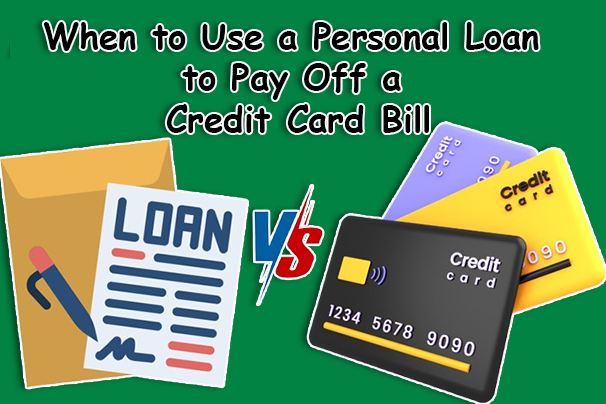When to Use a Personal Loan to Pay Off a Credit Card Bill- Paying off debts can be very overwhelming most times. Sometimes, a loan may be necessary to pay off or consolidate debts, despite not being one’s preferred option. Since credit cards have high interest rates, you should know when to take a personal loan to pay off a credit card payment.

Personal loans are typically utilized for various expenses such as wedding, medical, home improvement, and debt consolidation. With a personal loan, you can pay off credit card bills, but timing is quite important. The write-up outlines when personal loans may be necessary to pay off debts and when they may not be necessary for credit card bills.
When to Use a Personal Loan to Pay Off a Credit Card Bill
Debt consolidation is a convenient and efficient way to manage multiple debts, including credit card bills, by obtaining a personal loan with affordable interest rates. This process is beneficial if you can qualify for the best interest rate and term. The greatest personal loan interest rates can be found by comparing multiple offers and rates.
When Not to Use a Personal Loan to Pay Off a Credit Card Bill
Personal loans can be used to pay off credit card bills in certain situations, but it’s not always a wise decision. A different consolidation method may be a good idea depending on your needs and situation. These methods include
Paying Off a Small Debt Quickly
If your credit card account can be paid off within 12 to 21 months, consider a balance transfer credit card. You may be eligible for a 21-month interest balance transfer without an annual percentage rate (APR) on your credit card. However, you will be required to pay a balance transfer fee, which costs between 3 and 5% of your transferred balance upfront. By paying off debts within the initial deal, you can significantly save on interest.
Keeping Your Spending Habits
Consolidating credit card bills does not alter bad spending habits, which contribute to the inability to repay debt.Instead, if you keep up that habit, you’ll end up in greater debt. Rethinking your financial plan before you consolidate your debt can help you handle your spending habits. Consulting a personal finance coach or professional can help you identify effective budgeting strategies and prevent debt accumulation.
In Need of Help with Your Debt
There are times when your debts must have accumulated beyond your power and savings to pay off the debt. Working with a debt relief organization or a non-profit Consumer Credit Counseling Service is a better option for debt consolidation. This case may benefit from debt settlement or management plans. However, if you have accumulated too much debt that seems almost impossible to repay in the long run, you may be an applicant for bankruptcy.
Other Alternatives to Manage Credit Card Bills
Personal loans are a viable option for paying off credit card debt. However, not everyone may find it the best choice. Credit card bill management solutions, including debt settlement, balance transfers, and debt management programs, enable easy bill payment.


